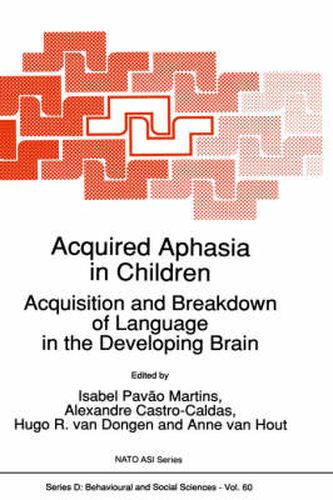Readings Newsletter
Become a Readings Member to make your shopping experience even easier.
Sign in or sign up for free!
You’re not far away from qualifying for FREE standard shipping within Australia
You’ve qualified for FREE standard shipping within Australia
The cart is loading…






This title is printed to order. This book may have been self-published. If so, we cannot guarantee the quality of the content. In the main most books will have gone through the editing process however some may not. We therefore suggest that you be aware of this before ordering this book. If in doubt check either the author or publisher’s details as we are unable to accept any returns unless they are faulty. Please contact us if you have any questions.
One of the most fascinating problems in Behavioural Neurology is the question of the cerebral organization for language during childhood. Acquired aphasia in children, albeit rare, is a unique circumstance in which to study the relations between language and the brain during cerebral maturation. Its study further contributes to our understanding of the recovery processes and brain plasticity during childhood. But while there is a great amount of information and experimental work on brain-behaviour relationships in adult subjects, the literature about the effects of focal brain lesions in children is both exiguous and scattered throughout scientific journals and books. We felt it was time to organize a meeting where scientists in this field could compare their experiences and discuss ideas coming from different areas of research. A workshop on Acquired Aphasia in Children was held in Sintra, Portugal, on September 13-15, 1990, and attended by 44 participants from 13 differents countries. The atmosphere was relaxed and informal and the group was kept small to achieve this effect. It was a very lively and pleasant meeting. Some consensus was indeed arrived at concerning methodological problems, definition of terms, and guidelines for future research. The main contributions are collected in this book which, we hope, will serve the scientific community as a reference work on Childhood Aphasia. I,P.M., AC.C.
$9.00 standard shipping within Australia
FREE standard shipping within Australia for orders over $100.00
Express & International shipping calculated at checkout
This title is printed to order. This book may have been self-published. If so, we cannot guarantee the quality of the content. In the main most books will have gone through the editing process however some may not. We therefore suggest that you be aware of this before ordering this book. If in doubt check either the author or publisher’s details as we are unable to accept any returns unless they are faulty. Please contact us if you have any questions.
One of the most fascinating problems in Behavioural Neurology is the question of the cerebral organization for language during childhood. Acquired aphasia in children, albeit rare, is a unique circumstance in which to study the relations between language and the brain during cerebral maturation. Its study further contributes to our understanding of the recovery processes and brain plasticity during childhood. But while there is a great amount of information and experimental work on brain-behaviour relationships in adult subjects, the literature about the effects of focal brain lesions in children is both exiguous and scattered throughout scientific journals and books. We felt it was time to organize a meeting where scientists in this field could compare their experiences and discuss ideas coming from different areas of research. A workshop on Acquired Aphasia in Children was held in Sintra, Portugal, on September 13-15, 1990, and attended by 44 participants from 13 differents countries. The atmosphere was relaxed and informal and the group was kept small to achieve this effect. It was a very lively and pleasant meeting. Some consensus was indeed arrived at concerning methodological problems, definition of terms, and guidelines for future research. The main contributions are collected in this book which, we hope, will serve the scientific community as a reference work on Childhood Aphasia. I,P.M., AC.C.